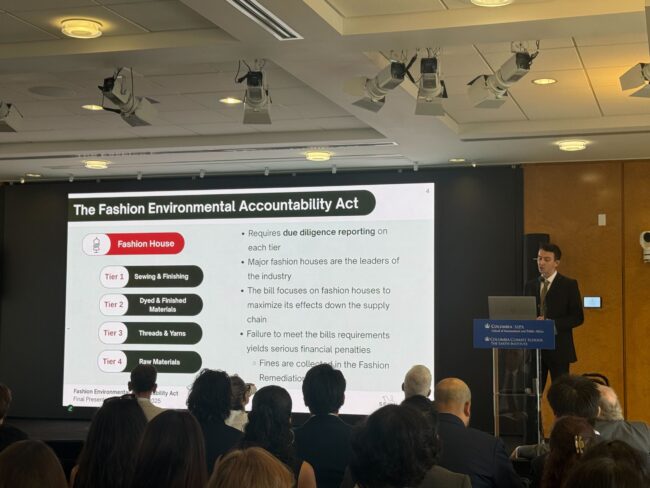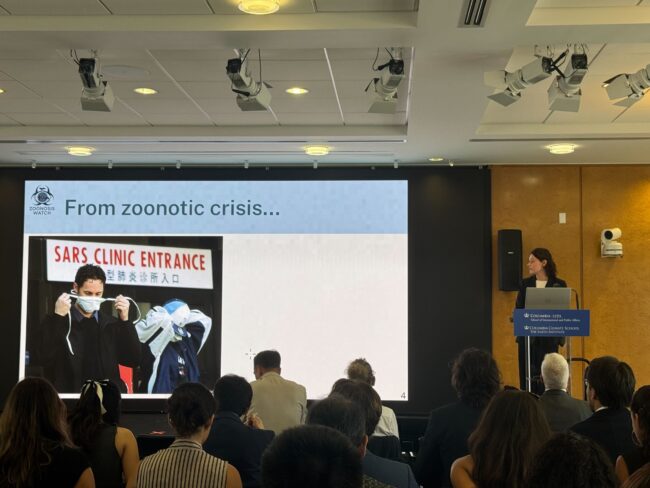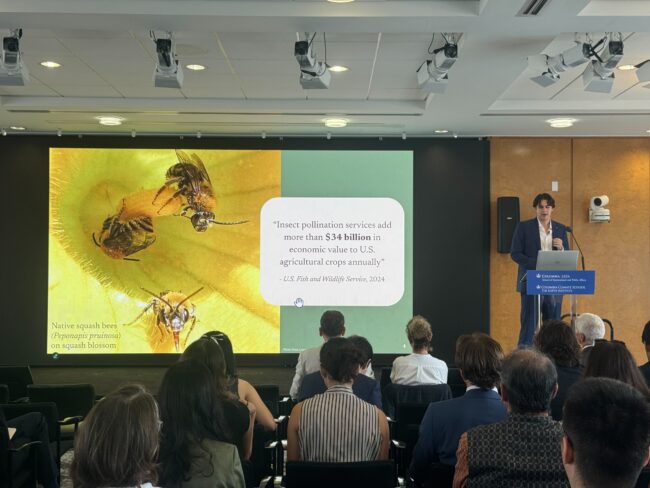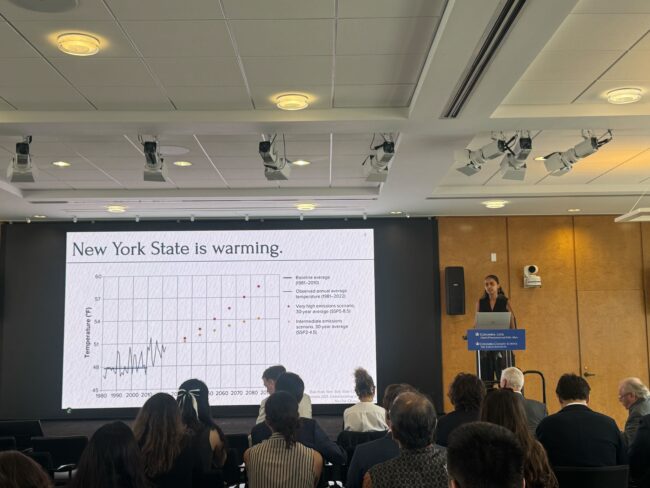Each year, students in Columbia University’s Master of Public Administration in Environmental Science and Policy (MPA-ESP) program take on a central challenge: turning complex science into actionable policy.
Through the Workshop in Applied Earth Systems Policy Analysis, students study bills that are still in the early stages of approval. In the summer term, they focus on science. Then, in the fall, they turn to the policy and explore how implementation might unfold.
Holding Fashion Accountable
Last summer, the students’ final briefings highlighted how policymakers are applying science to issues that touch daily life in New York, from fashion and drinking water to pollinators, animal markets and urban shade. Read more about their presentations below. (Photos by Amanda Biscoe.)

Presenter: Maxwell Holland | Advisor: Howard Apsan
Fashion is often celebrated for its creativity, yet behind the runway lies a major environmental cost. Roughly 10 percent of global greenhouse gas emissions come from the sector. Holland presented the Fashion Environmental Accountability Act, which would require manufacturers to disclose their Scope 1, 2 and 3 emissions.
The presentation included examples such as Prada’s efforts to track supply chain emissions and Coach’s sustainable line, Coachtopia, which produces bags with a 71 percent lower impact than conventional models. The bill’s penalties are steep. At $15,000 per day, fines could add up to billions of dollars annually.
“Tracing emissions throughout the supply chain is incredibly difficult,” Holland said. “But if even a few major fashion houses start reporting consistently, it could create pressure across the industry.”
Protecting New Yorkers From Lead in Water
Presenter: Josh Argentine | Advisor: Steve Cohen
New Yorkers often describe their water as “champagne water,” sourced from the pristine Catskills. Yet, as Argentine pointed out, aging lead service lines threaten to turn that into the “flat beer” of tap water.
The proposed City Council legislation (NYC Council Introduction 942: Replacement of Lead Water Service Lines) would require the replacement of lead service lines. More than 2 million New Yorkers could be affected, with children especially vulnerable. Lead exposure damages the brain, bones, blood, kidneys and nervous system. However, studies show that lead levels in water can fall by more than 50 percent within just three days of replacement.
Still, challenges remain. Replacing the pipes can cost more than $10,000, and the lowest income households are least able to afford it. The bill does not currently include subsidies, unlike similar programs in Newark and Madison. There are also questions about how residents who do not control their buildings’ water systems will learn if their service lines contain lead.
“We often think about water quality in terms of the source,” Argentine said. “This project made me realize how much the infrastructure beneath our feet matters for equity and health.”
Preventing the Next Pandemic

Presenter: Laura Bookstaver | Advisor: Bob Cook
The COVID-19 pandemic underscored the risks of zoonotic diseases—those transmitted from animals to humans. Seventy-five percent of new or emerging diseases come from such transmission. With around 80 live animal markets across the city, New York is especially vulnerable.
The NY State Assembly Bill A05947, which is under review, would prohibit the import of certain wildlife and fish, and place restrictions on live animal markets. It calls for a prohibited species list, supply chain bans and license suspensions for violations. By breaking transmission pathways, the bill seeks to reduce the risk of the next pandemic.
“This project reminded me that public health isn’t just about hospitals and vaccines,” Bookstaver said. “It is also about what happens in markets and ecosystems, and how regulation can prevent crises before they start.”
Protecting Pollinators

Presenter: Brendan Chapko | Advisor: Matthew Palmer
“Insects are the little things that run the world,” Chapko told the audience. Yet scientists have reliable data on only about one percent of insect species.
The Pollinator Promotion Act encourages state leaders to access climate funds and create strategies to strengthen pollinator populations, which are essential to balanced ecosystems. The bill also calls for partnerships with schools, community groups and researchers.
“Pollinators are essential but often invisible in policymaking,” Chapko said. “Working on this bill showed me how science and community knowledge can come together to create momentum for ecological change.”
Cooling the City with Shade

Presenter: Muskaan Khemani | Advisor: Louise Rosen
With temperatures in New York projected to rise by three to five degrees Celsius in the coming years, urban heat is a growing concern. The SHADE Act proposes sustainable shade infrastructure to help reduce city temperatures by up to 15 degrees Fahrenheit.
Beyond cooling, the bill suggests shade could support outdoor economic activity and make neighborhoods more resilient. Students noted, however, that measuring economic benefits will be complex, and that focusing only on shade infrastructure may leave out complementary solutions.
“Infrastructure is not only about concrete and steel,” Khemani said. “It can also be trees and shade that make cities livable as the climate changes.”
Turning Science Into Policy
In his closing remarks, Steve Cohen, director of the MPA-ESP program, emphasized the larger purpose of the workshop.
“Students are learning how to produce science-informed policy,” he said. “It is critical to be able to communicate science to non-scientists.”
This was the first time the course focused entirely on local issues, reflecting the political moment we are facing. Next semester, students will build on the scientific groundwork by developing implementation strategies and considering what it would take for these bills to become law.
The M.P.A. in Environmental Science and Policy program is offered by the Columbia Climate School in partnership with Columbia’s School of International and Public Affairs.


